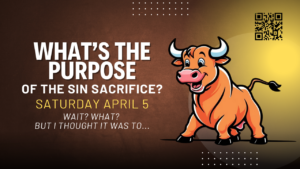Living a Life Centered on God: Beyond Religion to Relationship
In our fast-paced modern world, it’s easy to compartmentalize our faith, treating it as just another aspect of our lives rather than the foundation upon which everything else is built. But what if we were to reimagine our relationship with God as something far more integral to our daily existence?
The ancient Israelites, fresh from their exodus from Egypt, were given a profound lesson in what it means to truly live with God at the center. As they gathered at Mount Sinai, God instructed them to build a Tabernacle – a physical representation of His presence among them. This wasn’t just a religious structure; it was placed at the heart of their camp, a constant reminder that God desired to dwell with His people.
Fast forward to the book of Leviticus, and we find detailed instructions on how the Israelites were to express their loyalty to God. While the concept of animal sacrifices and agricultural offerings may seem foreign to us today, the underlying principle remains vitally important: how do we form a community centered around holiness?
The prophet Micah beautifully distills this idea:
“He has told you, humanity, what is good, and what Adonai is seeking from you: Only to practice justice, to love mercy, and to walk humbly with your God.” (Micah 6:8)
This verse doesn’t negate the offering system; rather, it reveals its true purpose. Through these practices, we learn about grace, mercy, justice, and humility before God. Today, we can understand these ancient rituals through the lens of Messiah Yeshua (Jesus), who made the ultimate atonement for our sins. Through faith in Him, we are justified, and the indwelling Holy Spirit empowers us to live out these virtues daily – if we choose to do so.
The key is recognizing that our relationship with God isn’t meant to be confined to a “religious” compartment of our lives. It should permeate everything we do, every decision we make, every interaction we have. This was the reality for the Jewish people for centuries – their faith wasn’t a separate “religion,” but an all-encompassing way of life.
Time itself took on a sacred rhythm, with weekly Sabbaths, monthly new moons, and annual feasts creating a circular pattern that constantly reminded them of God’s presence and promises. From birth to death, every significant life event was viewed through the lens of covenant relationship with the Creator.
In our secular age, we often struggle to see how God connects to our jobs, our schoolwork, or our online presence. But what if we challenged ourselves to integrate our faith as fully as those ancient Israelites did? What if the Word of God became so ingrained in our daily routines that it ceased to be a “religion” and truly became our life?
The book of Leviticus opens with a powerful phrase: “Now Adonai called to Moses…” This divine invitation reminds us that even when we feel unworthy or unable to approach God, He is the one who initiates contact. Just as Moses was called to draw near despite his limitations, we too are invited into God’s presence.
James echoes this truth: “Draw near to God, and He will draw near to you.” (James 4:8)
The System Used to Draw Near to God
One of the most intriguing aspects of the Levitical system is its focus on unintentional sins. These are the small infractions we often brush off – a white lie that slips out, a moment of gossip, a forgotten promise. Yet God takes these seriously enough to require atonement. This should cause us to reflect on how we view our “minor” transgressions. Are we too quick to excuse them?
The sacrificial system made a clear distinction: there were offerings for unintentional sins, but for deliberate, willful sin, the only remedy was genuine repentance and turning back to God. This challenges us to live with greater intentionality, always conscious of our actions and words.
In light of Yeshua’s ultimate sacrifice, we understand that His blood covers our sins, both great and small. But this should motivate us to strive for greater holiness, not become complacent. As the Apostle Paul urges: “I urge you therefore, brothers and sisters, by the mercies of God, to present your bodies as a living sacrifice—holy, acceptable to God—which is your spiritual service.” (Romans 12:1)
This call to be a “living sacrifice” invites us to move beyond mere religious observance to a lifestyle of constant surrender and obedience to God. It’s about guarding our thoughts, actions, and words, remaining loyal to God even when it conflicts with our ego or desires. The prophet Hosea reminds us of what truly matters to God:
“For I delight in loyalty and not sacrifice, knowledge of God more than burnt offerings.” (Hosea 6:6)
Similarly, the prophet Samuel declared: “Does Adonai delight in burnt offerings and sacrifices as in obeying the voice of Adonai? Behold, to obey is better than sacrifice, to pay heed than the fat of rams.” (1 Samuel 15:22)
As we reflect on these ancient truths, we’re challenged to examine our own lives. Have we relegated our faith to a comfortable corner, only to be accessed on certain days or in specific settings? Or are we allowing it to permeate every aspect of our existence?
The invitation stands: to move beyond mere religion, beyond ritual, to a vibrant, all-encompassing relationship with the living God. It’s a call to make every moment an opportunity for worship, every decision an act of obedience, every interaction a chance to reflect His love and justice.
With the help of the Holy Spirit, we can transform our understanding of faith from a set of beliefs we occasionally reference to the very air we breathe. May we have the courage to step into this fuller, richer life – one where God is truly connected to everything we do, finding joy and purpose in His constant presence.